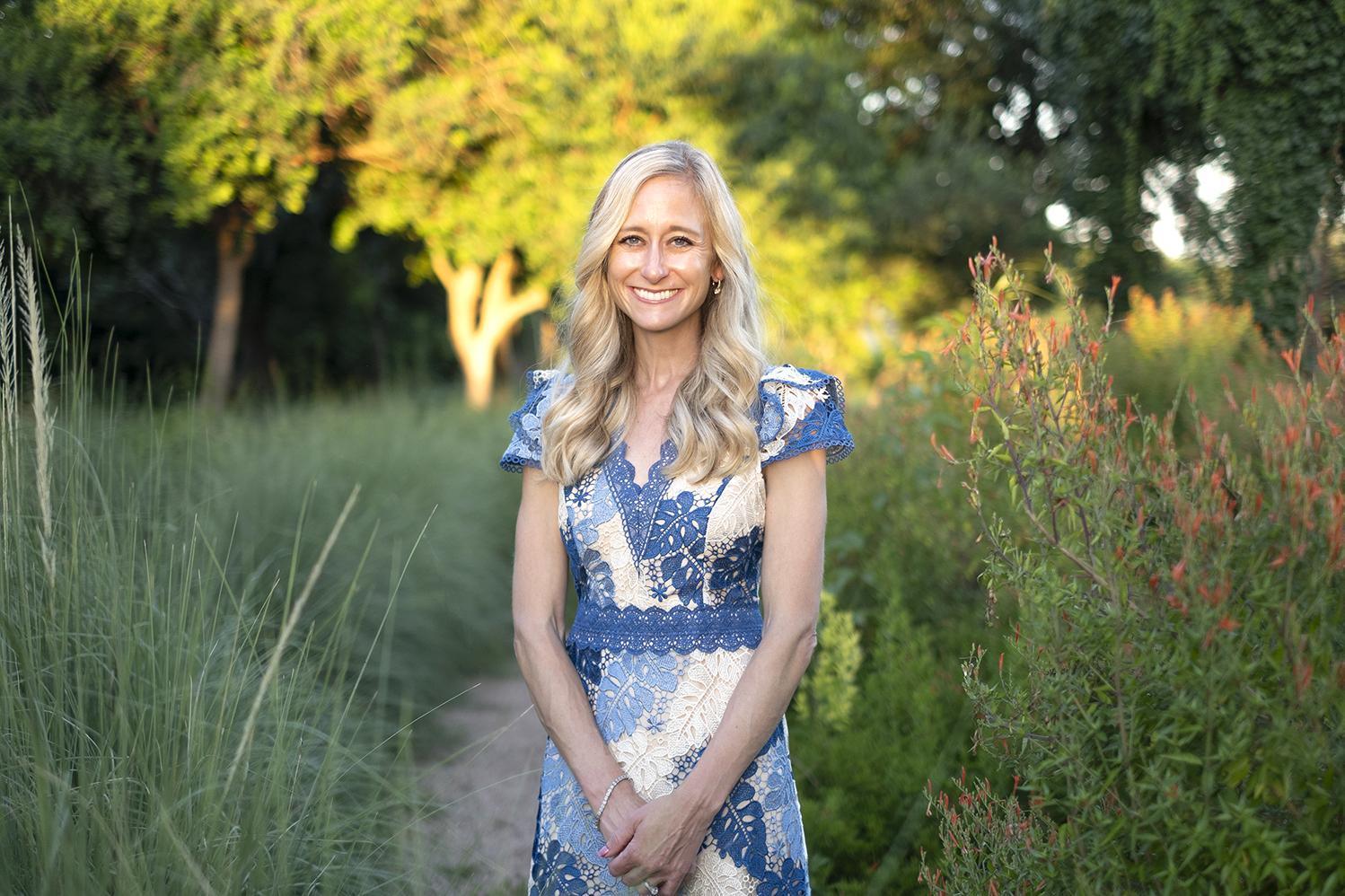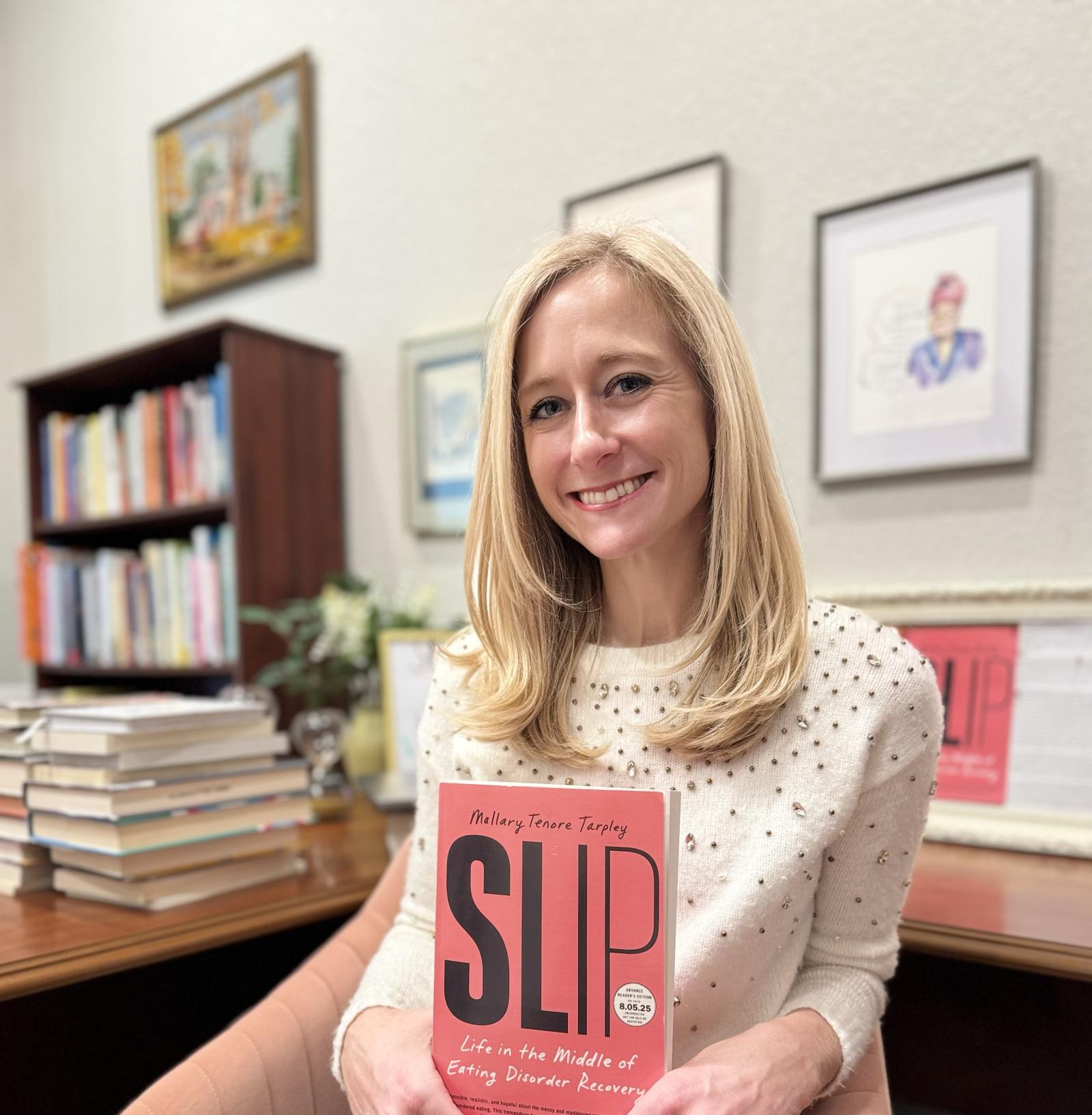Shifting the narrative

Mallary Tenore Tarpley, an assistant professor of practice in Moody College of Communication’s School of Journalism and Media, isn’t afraid to be vulnerable in her work. She frequently has her personal narratives published by prestigious outlets like The New York Times, The Washington Post and beyond. The writing of her debut memoir, “SLIP: Life in the Middle of Eating Disorder Recovery”, though, was uncharted territory.
“Certainly, it takes a fair amount of vulnerability to tell your own personal story,” Tarpley said, “For me, that was particularly true with this book because it’s the most honest thing I’ve ever written.”
She says that earlier in her career, she always wrote about her eating disorder as if it was something from her past, as if she was fully recovered. She soon realized that there was a disconnect between the narrative she was willing to share and the one that she was living.
“I was still struggling in a lot of ways, but I had been in treatment throughout my teenage years, so I thought I was supposed to be fully recovered and that I needed to maintain that image,” she said. “As a journalist, that felt inauthentic to me, but I was too afraid to really share the hard truths of my reality.”
Tarpley thought she would never be able to write a book detailing her experience until she was fully recovered, but that day never came.
“So, I thought, what if I were to explore a different narrative and the fact that many people continue to struggle with some aspect of their disorder?” she said. “There is a lot of stigma and shame around slips and lapses, but what if we removed that stigma and really gave voice to people who find themselves in this place where slips happen, but progress is still possible?”
“SLIP” is not simply Tarpley’s story alone, though. To write the book, she surveyed over 700 people from around the world with lived experiences with eating disorders. She then went on to interview approximately 175 survey respondents, clinicians and researchers. She says her goal was to weave all of that together to not only enhance her narrative but to help educate readers on what eating disorders are, how they take shape and why recovery can be so difficult.
Tarpley says she wrote “SLIP” to draw attention to what she calls “the middle place” between acute sickness and full recovery, and to destigmatize the slips that often occur here. The middle place is rarely talked about in eating disorder literature, Tarpley said, and she hopes to change that. She also wants the book to help caretakers, educators and medical professionals learn more about eating disorders, which are often misunderstood.
“We have a long way to go in terms of educating people on eating disorders, so that’s a lot of what I wanted to do in this book,” she said. “There’s so much fascinating research that has emerged in recent years, particularly around the neurobiology of eating disorders and the genetic components. Those are things that I didn’t know about even as someone with lived experience.”

Tarpley says that both as a memoirist and a journalist, she wants her book to make the research more digestible and more accessible to a wider audience. This was part of her inspiration for using her skills as a journalist to tell her deeply personal story.
Initially, Tarpley says that her book proposal wasn't received as well as she had hoped. She says she received a number of rejections before getting the one "yes" she needed. She's able to use this as a teachable moment in her classes though, whether she's teaching undergraduates or graduate students in creative nonfiction or long-form feature writing.
"It's just par for the course as a writer or journalist," Tarpley said. "It's something I talk a lot about with my students. They are going to get rejected so I think it's really important to normalize rejection."
Once she landed a book deal, she also received a grant from the Alfred P. Sloan Foundation. The grant allowed her to advance the science-based reporting for the book, giving her the resources she needed to attend eating disorder conferences and interview people who are studying the brain-based alterations that occur in eating disorders, as well as geneticists who are exploring the genetic components.
With all her research, and hundreds of survey responses, she was then faced with the task of figuring out how to structure the book.
“That was one of the greatest challenges,” Tarpley said. “There are a lot of books that are mostly memoir, but then they weave in a little bit of reporting, or it’s mostly reported with a hint of memoir. Mine was equally both.”
She says her editor suggested she combine the reporting and the personal narrative in each chapter as opposed to alternating each, and that’s eventually how the book came together.
“In the first part of each chapter, I wrote from a very personal perspective; I kind of re-inhabited my younger self,” Tarpley said. “Then the second half of each chapter, I would bring in all of the reporting relating to the topics I explored in the personal narrative.”
She said she had to carve out her own path to figure out how to make this structure work in a way that almost felt as if her present day self was in conversation with her younger self.
While her primary hope is that many people can find comfort and vital resources in her book, she says that as a writing and journalism professor, she wants the book to give writers new ideas for thinking about how to skillfully blend personal storytelling with in-depth reporting.
“It was really validating because one of my early readers who’s a fellow journalist said that she felt as if I was carving out a new sort of genre,” Tarpley said. “I would like to think that it could be inspiration for other writers who want to do the same thing.”
“SLIP: Life in the Middle of Eating Disorder Recovery” is now available for purchase wherever books are sold.
